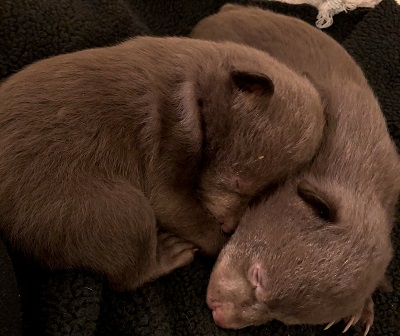A Siskiyou County man has pleaded guilty to unlawful possession of two bear cubs and obstructing wildlife officers, the California Department of Fish and Wildlife (CDFW) announced recently. Cody Dylon Setzer, 29, Yreka, took two bear cubs from their den and sow (mother bear) after finding the den site in a fallen log across a forest road. The bear cubs were estimated to be less than four weeks old at the time Setzer took them.
Wildlife officers became aware of the bear cubs on March 9, 2019, when Setzer called them, claiming he had found the cubs along the roadside on Highway 263 north of Yreka. A wildlife officer became suspicious of Setzer’s story when no bear tracks or habitat were found at the location where Setzer claimed he had found them.
The bear cubs were transported to CDFW’s Wildlife Health Laboratory in Rancho Cordova. Wildlife forensics scientists with CDFW’s Wildlife Forensics Laboratory used DNA samples to establish the bear cubs were likely born in the Sacramento River canyon in northern Shasta County, more than 90 miles south of where Setzer claimed he had located them.
During the investigation, wildlife officers determined Setzer and a co-worker at a local timber management company took the cubs from a den inside a tree that had fallen across an access road to a work site. The co-worker took officers to the location of the den site east of Salt Creek and Interstate 5. Further evidence was collected from the den site, which had been destroyed by both men. The sow was never located.

The two tiny bear cubs after their recovery by CDFW wildlife officers. CDFW photo.
The cubs were turned over to Lake Tahoe Wildlife Care (LTWC) for long-term rehabilitation. LTWC said the cubs were the youngest ever brought into its facility. After growing old enough to survive on their own, the cubs were returned to their native habitat in Shasta County on April 28, 2020.
On Nov. 17, 2021, Setzer pleaded guilty in Siskiyou Superior Court to possession of a prohibited species and obstructing a peace officer in the course of his duties. Coincidentally, Setzer had also been prosecuted for a separate, unrelated case and the district attorney’s office agreed to combine sentencing for both.Due to his guilty plea on both cases, he was ordered to pay $2,290 in fines and fees and complete 200 hours of community service. Setzer was also placed on probation for 12 months with his hunting and fishing privileges suspended for the duration of his probation, and sentenced to 90 days in the county jail, which will be stayed if he successfully completes probation.
If you witness a poaching or polluting incident, or any fish and wildlife violation, or have information about such a violation, immediately dial the toll free CalTIP number 1-888 334-CALTIP (888-334-2258), 24 hours a day, seven days a week.
Tips may also be submitted anonymously to CDFW using tip411, an internet-based tool that enables the public to text an anonymous tip to wildlife officers and lets the officers respond, thus creating an anonymous two-way conversation. Anyone with a cell phone may send an anonymous tip to CDFW by texting "CALTIP", followed by a space and the message, to 847411 (tip411).